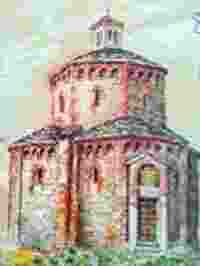Prophet

Joel
He is the first of the two minor prophets.
He is also the prophet of penance, his invitations are to fasting and prayer.
Join us
Joel Prophet
The day of the Lord and of his judgment is the central idea of Joel's message; it can be deduced from the natural events that loom, such as drought, invasions of insects and the like, and from the reading that Joel gives of them, seeing in them the possibility of a new life and a new spirit on the part of God.
Faced with a famine caused by grasshoppers, Joel reads there the sign of God's judgment: "The countryside is barren, the soil is in mourning: the wheat is devastated, the must is gone. The oil is gone! farmers, yell winemakers, for wheat and barley: the harvest of the fields is lost! the vine has dried up, the fig tree has withered; the pomegranate with the palm and apple tree, all the trees in the field have dried. Gaiety has disappeared among the children of man".
(Gl 1,10-12).
God tolerates evil more than we can understand, but his patience does not last forever. When Joel announces the "day of the Lord" it is as if he were saying that God's patience is running out and his wrath is about to arrive. And here he is, therefore, pleading a heartfelt invitation to penance: "Gird yourselves, make lamentations, priests, shout, ministers of the altar! ... Prescribe a ritual fast, call a meeting; gathered the elders and all the inhabitants of the country in the house of the Lord your God and cry out to the Lord! " (Gl 1: 13-14).
And he himself joins in prayer, to request His beneficial intervention: "To you, Lord, I cry! The fire has devoured the pastures of the desert; the flame has consumed all the plants of the field! Even wild animals turn to you, because the streams have dried up and the fire has devoured the pastures of the desert!".
(Gl 1: 19-20)..
The outpouring of the spirit
After having spurred the people to repentance, which actually takes place, he comforts them with the announcement of a new and great benevolence on the part of the Lord.
Joel describes God's further blessings for a distant future, in which the Lord promises to send his Spirit upon every repentant person and grant salvation to anyone who invokes his name: "After this, I will pour out my spirit upon every man and your sons and your daughters will become prophets; your elders will dream, your young men will have visions. Also on slaves and on female slaves, in those days, I will pour out my spirit. I will do wonders in heaven and on earth, blood and fire and columns of smoke".
(Gl 3,1-3).
Joel, when he speaks of the "day of the Lord", is not referring to a random day, but to a particular moment in which God will manifest the judgment on the sin of His people but, at the same time, will bless Israel for returning from exile: "Egypt will become a desolation and Idumea a barren desert for the violence against the children of Judah, for the innocent blood shed in their land, while Judah will always be inhabited and Jerusalem from generation to generation. I will avenge their blood, not I will leave him unpunished, and the Lord will dwell in Zion"
(Gl 4: 19-21).
Whoever gets lost and takes different or distant paths, will certainly suffer the consequences of his actions but, if he returns to God, he will receive the protection of new blessings and will enjoy His generosity: "On that day the mountains will drip new wine and milk will flow through the hills; in all the brooks of Judah the waters will flow. A spring will gush from the house of the Lord and water the valley of Shittim".
(Jl 4:18).
